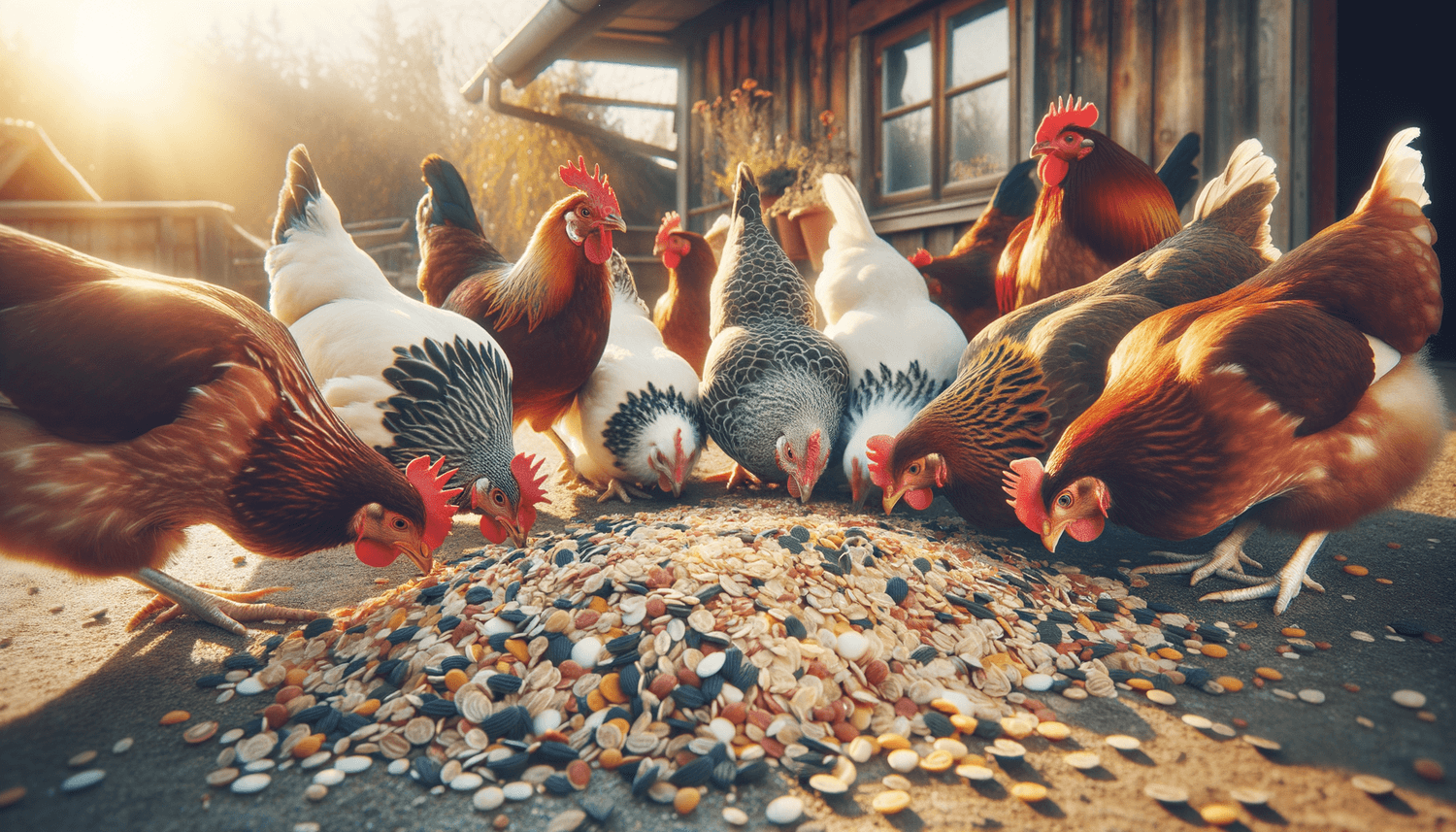Calling all chicken enthusiasts, gather ’round and listen up like a hen waiting for a tasty treat! Ever wondered whether your backyard feathery friends can indulge in the lavish spread of birdseed just like their wild bird buddies do? Well, we’ve got the answers for you! In this article, we’ll cluck away about if chickens can have birdseed, the egg-citing importance of a balanced diet, the benefits (or risks) of birdseed, its nutritional value, and even how to whip up the perfect birdseed dish for your flock. Spread your wings; it’s time for a peck at this cracking good adventure!
Can chickens eat birdseed?
Yes, chickens can eat birdseed, and it is generally safe for them. However, it should be offered in moderation, as birdseed should not replace their main diet. A balanced diet is crucial for chickens, and birdseed can be a delightful treat or supplement to their regular feed, but it should not be the primary source of nutrition.
A cluck-worthy balanced diet for chickens
Just like us humans, chickens need a balanced diet to thrive and live their best feathery life. Ensuring they receive the proper nutrients is essential for their overall health, egg production, and happiness. A chicken’s diet should primarily consist of a high-quality chicken feed, which should make up around 80-90% of what they consume. Chicken feed is formulated specifically to provide them with the essential vitamins, minerals, proteins, and carbohydrates they need.
The remaining 10-20% of their diet can be a delightful variety of treats, just like how we humans enjoy our desserts and snacks. Chickens love feasting on fruits and vegetables that not only provide a different taste from their regular feed but offer additional nutrients and variety to their diet. Make sure not to overindulge your flock with too many treats, though! Maintaining the balance between chicken feed and tasty extras is essential for their health and wellness.
Nutritional value of birdseed for chickens.
Feeding birdseed to chickens can be beneficial to their overall diet, provided it’s offered in moderation. Birdseed is typically a mix of various seeds such as sunflower seeds, millet, safflower, corn, and more. Each of these seeds brings its own set of nutritional qualities and benefits to the table.
Sunflower seeds are rich in healthy fats, as well as vitamins and minerals like vitamin E and selenium, which contribute to overall immune health. They also have ample protein content, which is essential for supporting muscle, feather, and egg development. Millet, on the other hand, is rich in B vitamins like niacin, thiamine, and riboflavin, which are helpful for maintaining energy production and cells’ normal functions. Additionally, millet is packed with essential minerals like magnesium, phosphorus, and manganese that support bone development and overall health.
Safflower seeds offer an excellent source of energy and provide healthy unsaturated fats. These seeds contain linoleic acid, which is essential for the overall wellbeing of your chickens. Corn can bring some necessary carbohydrates into the mix, providing energy for daily activities and maintaining body temperature—especially crucial during colder months.
However, it’s important to remember that birdseed alone doesn’t provide a complete and balanced diet for chickens. While these seeds can offer some valuable nutrients, they should be treated as supplementary treats and not a primary source of nutrition for your flock.
Nutrition table of birdseed for chickens.
| Information | Description |
|---|---|
| Nutritional Value | Birdseed contains vitamins, minerals, proteins, healthy fats, and carbohydrates, depending on the mix of ingredients. |
| Suggested Serving Size | Offer birdseed in moderation, with supplements consisting of only 10-20% of chickens’ overall diet. |
| Safe Feeding Practices | Ensure the birdseed mix is free of additives, preservatives or pesticides, and remove any leftover birdseed to prevent mold from growing in their feeders. |
| Preparation | No special preparation is necessary, as birdseed can be fed directly to your chickens. |
| Potential Risks | Feeding large amounts of birdseed can lead to an imbalanced diet and possibly introduce foreign contaminants, if not sourced from a trusted supplier. |
| Hydration | While birdseed does not provide significant hydration, always provide chickens with fresh water alongside their food. |
| Digestion | Birdseed is typically easy for chickens to digest, although large quantities can sometimes cause minor digestive issues. |
| Seasonal Availability | Birdseed is usually available throughout the year, providing a consistent treat for your flock. |
| Other Benefits | Feeding birdseed to chickens encourages natural foraging behaviors and can serve as a source of entertainment. |
Birdseed options for your flock
When choosing birdseed for your chickens, it might be helpful to consider the specific types of seeds included in the mix. Different seeds offer different nutrients, and you may want to cater to the particular needs of your flock. Look for birdseed that consists primarily of sunflower seeds, millet, safflower, and corn, as they provide the most beneficial nutrients for your chickens. Make sure to select birdseed mixes that are free from additives, preservatives, and pesticides. It’s best to source your birdseed from a reliable and trusted supplier to ensure the safety and quality of the product.
Monitor your chickens’ health
As with any dietary changes or treats, it’s essential to monitor your chickens’ health when introducing birdseed into their diet. Keep an eye on their behavior, egg production, and overall wellbeing to ensure they are thriving. If you notice any adverse effects or unusual changes, consult with a veterinarian or poultry expert to determine if birdseed is suitable for your flock.
Treats beyond birdseed
Birdseed isn’t the only fun and nutritious treat you can offer your chickens! There is a wide variety of fruits, vegetables, and grains that can provide exceptional benefits, variety, and enjoyment for your flock. Some popular treats for chickens include watermelon, pumpkin, lettuce, and cooked oatmeal. Remember always to practice moderation and continue to prioritize a balanced diet for your feathered friends.

















